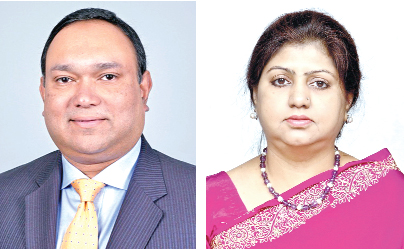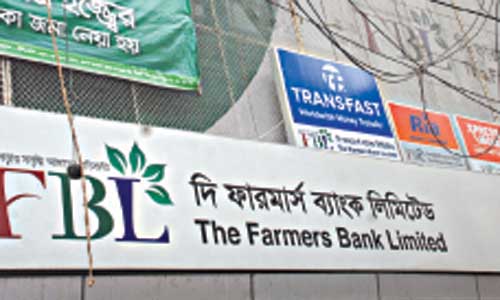Banking
Reshadur elected chairman, Rokshana vice chairperson of Dhaka Bank
 Reshadur Rahman, Rokshana Zaman
Reshadur Rahman, Rokshana Zaman
Reshadur Rahman has been elected the chairman of the Board of the Directors of Dhaka Bank Limited recently. The bank also re-elect Mrs Rokshana Zaman as its vice chairperson, says a press release. Mr Rahman is a successful entrepreneur and is associated with a great deal of progressive alliance with several companies at home and abroad. Endowed with over 30 years of excellent industrialist career, he has taken part in numerous professional organisations, social services, philanthropic activities. He is also the honorary consul of the Republic of Poland in Bangladesh.
News:The Daily Star/21-May-2015
TK 50 CRORE LOAN ANOMALIES BB asks Farmers Bank to remove EC committee chairman Chisty
 A file photo shows the headquarters of The Farmers Bank in Dhaka. Bangladesh Bank has asked Farmers Bank to remove its executive committee chairman Md Mahabubul Haque Chisty for his involvement in irregularities for disbursing Tk 50 crore loans.
A file photo shows the headquarters of The Farmers Bank in Dhaka. Bangladesh Bank has asked Farmers Bank to remove its executive committee chairman Md Mahabubul Haque Chisty for his involvement in irregularities for disbursing Tk 50 crore loans.
Bangladesh Bank has asked the Farmers Bank Ltd to remove its executive committee chairman Md Mahabubul Haque Chisty for his involvement in irregularities for disbursing Tk 50 crore loans. The BB issued a letter to the Farmers Bank chairman Mohiuddin Khan Alamgir on May 17, asking him to remove Chisty from the EC within 10 days. The BB said Chisty would not be allowed to stay with the bank’s EC committee, but he would be able to continue his job as a director. The bank’s EC chairman Chisty was directly responsible for the anomalies as he, in some cases, passed loans without taking the approval of the EC committee, by-passed branch recommendations in some cases and in other cases did not take any recommendations in sanctioning the credits, according to the BB letter. The central bank has taken the initiative to remove Chisty from EC committee under Article 46 of Bank Company Act 1991. The central bank served a show-cause notice on March 8, 2015 asking Chisty to reply why any action would not be taken against him. Chisty replied the show-cause notice to the BB on March 26 this year confessing that he was responsible for the anomalies. But he violated the rules and regulations inadvertently in disbursing the loans. The BB investigation teams conducted separate inspections at the bank’s Gulshan and Motijheel branches in November 2014 when they unearthed the irregularities. The BB investigation found Chisty approved an overdraft loan facility of Tk 5 crore to Prime Islami Securities Ltd, a client of the bank’s Motijheel Branch, without placing the loan proposal of the branch before the executive committee meeting, violating banking rules. In another case, Chisty initially unilaterally approved a loan of Tk 2.50 crore to Saif Powertec Ltd without taking any recommendation from the Gulshan Branch after Saif Powertec applied to the branch for taking a loan of Tk 3 crore as working capital on July 3, 2014. The EC committee of the bank, led by Chisty, on the other hand, granted Tk 8 crore loan to United Bricks and Fultola Filling Station on March 5, 2014 without taking any credit proposal from the bank’s Gulshan Branch. The EC committee on March 5, 2014 approved a credit limit of Tk 15 crore to Urban Design and Development Ltd against an under-construction flat which was worth Tk 5.91 crore. The BB report said that the committee had not taken proper mortgage against the loan which cause a threat to the depositors’ money. The EC committee in its 14th meeting also approved a term-loan of Tk 16 crore and a working capital of Tk 2 crore in favour of Chittagong Fisheries, also a client of the Gulshan Branch, to purchase a fishing trawler. The EC committee approved the loan before preparing the credit proposal by the bank’s branch.
News:New Age/21-May-2015Central banks playing with fire in growth push: RBI chief
The "spectre of deflation" is spurring the world's major central banks into a dangerous struggle for stronger domestic growth that imperils financial markets and ignores the needs of developing nations, Reserve Bank of India Governor Raghuram Rajan said on Tuesday.
Rajan, making a familiar argument for better global coordination on monetary policy, said central bankers in developed economies should take more seriously their international responsibilities.
He called for better leadership from the International Monetary Fund. The Fund, Rajan said, should examine each unconventional monetary policy that is proposed or in place around the world and decide whether it meets the greater good of the global economy.
"The current non-system in international monetary policy is, in my view, a source of substantial risk, both to sustainable growth as well as to the financial sector," Rajan told an audience of economists and investors in New York.
"I fear that in a world with weak aggregate demand, we may be engaged in a risky competition for a greater share of it," he added. "We are thereby also creating financial sector risks for when unconventional policies end."
The U.S. Federal Reserve, the European Central Bank and the Bank of Japan have purchased more than $10 trillion in bonds to fight deflation and help kick-start growth in their respective economies following the global recession.
The mass monetary easing had sent a rush of funds into developing economies like India, sending currencies and stocks to records.
More recently, the end of the Fed's bond-buying and the prospect of a U.S. interest rate hike has had the opposite effect, stoking volatility in financial markets.
Rajan, a former IMF chief economist, said that since "the spectre of deflation haunts central bankers," it is no wonder that developed countries do not want to settle for low growth "even if that is indeed their economy's potential."
Still they should not ignore their responsibilities to developing economies, he said, adding the IMF should be the arbiter of whether accommodative policies are "in- or out-of-bounds."
The "IMF is perfectly capable of doing these things. But it needs leadership. Because the central banks won't do it themselves, (the IMF) needs the political leadership," Rajan said after a speech to the Economic Club of New York.
"We have the organisation. It needs people to recognise that we are moving from crisis to crisis."
American, European and Japanese central bankers often acknowledge the volatile effects their policies have on the rest of the world.
But they argue that even developing economies benefit from their stronger domestic economies.
IMF Managing Director Christine Lagarde has applauded the aggressive monetary easing by major central banks and has warned against a premature tightening in the United States.
News:The Daily Star/21-May-2015
Six global banks fined nearly $6b for forex, Libor abuses

US and British regulators fined six major global banks nearly $6 billion Thursday for rigging the foreign exchange market and Libor interest rates.
The far-flung settlement included guilty pleas from Barclays Bank, JPMorgan Chase, Citicorp and the Royal Bank of Scotland for conspiring to manipulate the massive currency market, as well as a guilty plea from Switzerland's UBS, for violating a prior settlement of Libor charges.
A sixth bank, Bank of America, was fined $205 million by the US Federal Reserve over its foreign exchange trading operations.
The massive settlement addresses what regulators described as a brazen scheme by financial heavyweights to orchestrate trades in the $5.3-trillion-per-day global foreign exchange market in ways that cheated clients and bolstered their own profits.
Traders from banks communicated with instant messages and in a chat room referred to as "the Cartel," regulators said.
The size of penalties on individual banks ranged from the hundreds of millions of dollars to $2.4 billion for British bank Barclays, depending on a bank's involvement in the scheme and whether it had already settled with some of the agencies involved in the global investigation.
The Barclays sum was high because it had not participated in an earlier deal between the banks and some of the regulators involved.
"Put simply, Barclays employees helped rig the foreign exchange market," said Benjamin Lawsky, the head of the Department of Financial Services for New York State.
"They engaged in a brazen 'heads I win, tails you lose' scheme to rip off their clients."
UBS said that it will plead guilty to fraud in the US over the Libor interest rate-rigging scandal and pay $203 million in fresh fines.
The bank will also pay a $342-million fine (307 million euros) to the US Federal Reserve and change the way its foreign exchange system works.
The Justice Department granted the Swiss bank conditional immunity in its foreign exchange probe for cooperating with the investigation. However, Justice demanded the guilty plea on Libor after concluding UBS' role in foreign exchange breached its 2012 non-prosecution agreement on Libor.
News:The Daily Star/21-May-2015Grameen Bank gets retrospective tax break at last

The National Board of Revenue has extended tax exemption benefits to Grameen Bank, clearing the Nobel Prize-winning organisation from the obligation to pay Tk 77.65 crore in tax.
The tax break, which came last week, was given retrospectively for a six-month period from January 1, 2011 to June 30, 2011.
The tax break means Grameen Bank will not have to pay the sum as tax for the six-month period, said a senior official of NBR, seeking to remain unnamed.
The decision comes two years after Grameen Bank had sought tax benefits from the government for the period, which was left out when the NBR had extended tax waiver benefit to the bank with a retrospective effect from July 1 to December 31 of 2011.
Grameen Bank had enjoyed tax exemption from its inception in 1983.
But due to a stand-off between the government and its founder Muhammad Yunus, the government had delayed the decision on whether it would extend the tax-free facility after the privilege had expired in December 2010.
As a result, the microfinance pioneer had to pay tax for this six-month period to comply with rules.
The bank had paid Tk 21.5 crore to the state coffer against NBR's tax claim of Tk 77.65 crore.
The NBR official said money that Grameen Bank had deposited might be adjusted with taxes if the authority does not extend the benefit after December 31 this year.
He said the decision on further extension of the tax break is yet to be taken.
News:The Daily Star/21-May-2015


